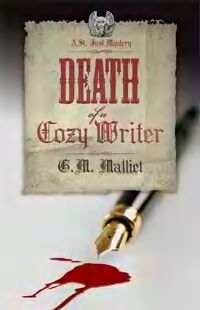 |
G.M. Malliet
An Interview by Julie Obermiller
It's always exciting to welcome a new author and characters to the mystery family. G.M. Malliet's “Death of a Cozy Writer” offers a slew of unforgettable characters in a background reminiscent of the great cozy writers of old. Inspector St. Just of the Cambridgeshire Constabulary is a perfect character for a series and leaves you waiting for another invitation to visit, The first book (see the review) and character grew from Malliet's love of traditional British mysteries and her bio calls it “…both an homage and gentle send-up to the genre.” Malliet certainly knows her English countryside, although Virginia , USA is her home. Living in England while studying at the University of Cambridge and Oxford , time that could have been spent on a thesis was spent weaving a mystery amongst the idyllic background of British countryside. Interrupted after only five chapters were written, the story was put away in a filing cabinet until Malliet applied for, and received, the Malice Domestic Grant. With so much support, she knew she needed to see the book through. Malliet has a bachelor's degree in journalism and worked for many years as a copywriter and reporter. Cozy was written, she says, in the pre-dawn hours of 4:30 to 7 a.m. before the day job began. The author is also president of the Virginia Writer's Association and is an advisor to (soon-to-be-lifetime member of) the 400 member Virginia Writer's Club. Her style is decidedly cozy and the book feels traditional, but proves to be quite ingeniously modern at the same time. Next up is “Death of a Lit Chick,” coming soon from Midnight Ink Books. Here's hoping Inspector Just will stay rooted in the quaintness of the genre as he gets caught up in worldly pursuits. Malliet graciously responded to questions about life as an author and future plans.
Q. Death of a Cozy Writer has a timeless feel to it, brought into the present only by sparse references like VISA cards or Meg Ryan . The teaser pages of your next offering seem to have a much more modern air. Intentional? A. First of all, thank you for saying Cozy has a “timeless feel.” I take that as a great compliment, since I was aiming to write a traditional mystery for the modern reader. Cozy is actually a bit of a send-up of the conventions of the Agatha Christie-type story, even though hers are the books I most love and reread often. She's the reason I always wanted to write mysteries. Death and the Lit Chick feels more modern, I imagine, since what we call “chick lit” is a modern phenomenon dating to the publication of Bridget Jones' Diary . Lit Chick is also a send-up, this time of the chick lit genre, but again I have to confess: I love some of these books. Helen Fielding created an Everywoman in the fallible Bridget Jones. But Lit Chick ended up being more a send-up of the publishing industry itself. As a struggling, unpublished author, I was thrown headlong into this strange and wonderful world, and I found many things there I wanted to record, if only for my own amusement. The tendency of the industry, and authors, to chase after whatever happens to be hot at the moment is one of those things. The pressures put on authors to produce and perform is another.
A. I've heard many authors say they started writing because the books they loved to read just weren't out there, or not in sufficient quantity. I agree. It's kind of amusing when you notice that although Agatha Christie has been gone since 1976, her books consistently hover near the top of Amazon's bestselling mystery lists. I guess a younger generation is finding her, or an older generation, like me, keeps misplacing all her books. I am also a fan of Caroline Graham, who wrote the Inspector Barnaby mysteries, beginning with the extraordinary The Killings at Badger's Drift . Her last Barnaby came out in 2004 and I have a real concern she's stopped writing them. For years I've read anything by Robert Barnard or Martha Grimes, and Peter Lovesey. On the darker side, P.D. James and Ruth Rendell/Barbara Vine.
Q. When writing a story, do you have a beginning, a plot and an end before you put it down, or does it evolve as you go? A. I start playing around with an idea, making notes on different characters, scraps of conversation, scenes and settings. I call this writing but it is probably another form of procrastination, of which forms I have many. After a few months of this “writing” I have a tremendous mess on my hands and bits of paper all over the house, but the plot has somehow begun developing in my mind. It's at this point I try to get all the notes into some kind of order, and I'll start to sketch a thin outline that only makes sense to me (“Chaper 7: St. Just talks with Hortense about the missing gazebo-like thing.”). As I get further into the actual writing, I drift away from the outline so much it becomes too much trouble to keep updating it, and eventually I abandon it. I never know where I'm headed at the beginning, but at about the midway point I have to decide, to quell the rising panic.
Q. What made you choose this setting for your story? Is there a lot of ongoing research for authenticity or just your own experiences? A. I lived in England ( Cambridge and Oxford ) for many years, and I visit as often as I can, about once a year. Writing about the U.K. is my version of time-travel. I'm happiest when I'm “there,” if only in my mind.
A. It depends (see above). When I've stopped fooling around and have started to hit my stride, I work a regular eight-hour schedule with a break for lunch or yoga class. (I'm hoping that if I can one day master the headstand, the plotting will come easier.)
Q. Is editing harder than writing the actual novel, as some suggest? How hard is it to edit, and cut, your own work? A. I find both things hard to do. When I reached the end of Death and the Lit Chick— at the point where I'd polished and repolished nearly every line several times—I finally stood back from it and realized there was a big scene that had to go, practically an entire chapter. It took me about four days to talk myself into doing this, and I tried desperately to avoid it, but I knew it had to be done. It really hurt. A. I doubt I could edit anyone else's book. I don't have the editing gene, and if I found something I didn't like, I'd be afraid of hurting the author's feelings. In the past several years I've found I'm not really reading; I'm studying and analyzing. I can't say writing has taken the joy out of reading for me—nothing could do that—but it's changed my habits. I've probably read Graham's Death of a Hollow Man ten times by now, and I know it's time to move on to a new author, but what a gift for characterization that woman has.
Q. What's next for Inspector St. Just of the Cambridgeshire Constabulary? A. I'm collecting scraps of paper for his third outing. This one is unusual in that I thought of a title that I loved and began writing around the title. I've never done that before, so we'll see how it goes. Q. What's your opinion of the current mystery/suspense offerings? Do new writers have a chance to break the ranks of prolific best-selling authors? Do you think "brand name buyers" are reluctant to "go generic?" Does that make it tough for new authors? A. I will take this as a state-of-the-industry question, about which I have accumulated many entrenched opinions. I subscribe to various writers' listserves and newsletters and, while I may ignore the advice therein at my peril, a lot of the advice from the pros doesn't seem to have a lot to do with me. The trend, as you know, is for mysteries built around a hobby or craft, the more unusual the better, since all the expected options have long been exhausted. But I don't really have any interesting hobbies, apart from yoga. I don't bobsled; I don't spelunk. My idea of an extreme sport is watching three episodes of Inspector Linley in a row. I do like food and fashion but I couldn't build a book around these topics. I am also not interested in creating a protagonist with a host of unusual or annoying quirks, not even a Poirot (of whom even Agatha tired). None of this should put me or anyone else outside the range of the interest of contemporary book publishers, but if you read the collected wisdom, it does. This must be why there are fewer writers of the type of mystery I love to read. Louise Penny is one of a handful of success stories in this regard. She writes lovely, straightforward detective stories set in Canada , and was told repeatedly by agents that a book set in Canada wouldn't sell. Of course, now she has won countless awards for her Inspector Gamache books but she nearly gave up in the face of this continuing opposition. Just last week I read advice from an editor who said that a Canadian setting is a tough sell. I really don't get this, but I am sure Alexander McCall Smith heard the same thing about Botswana . Thank God he ignored it. Agents said my story was too traditional—that modern readers wanted lots of action, lots of noir. I hope these are the same agents Louise submitted to.
A. If you really believe in your book and give it the respect it deserves (keep polishing!), someone else will, too. You may not have found that person yet, but don't ever give up Visit the author's website at gmmalliet.com. Check out more Midnight Ink mysteries at midnightinkbooks.com |
|
|
Past issues and stories
pre 2005.
Subscribe to our mailing
list for announcements.
Submit your work.
Advertise with us.
Contact us.
Forums, blogs, fan clubs,
and more.
About Mysterical-E.
Listen online or download
to go.
|
|
|
 |
 |



